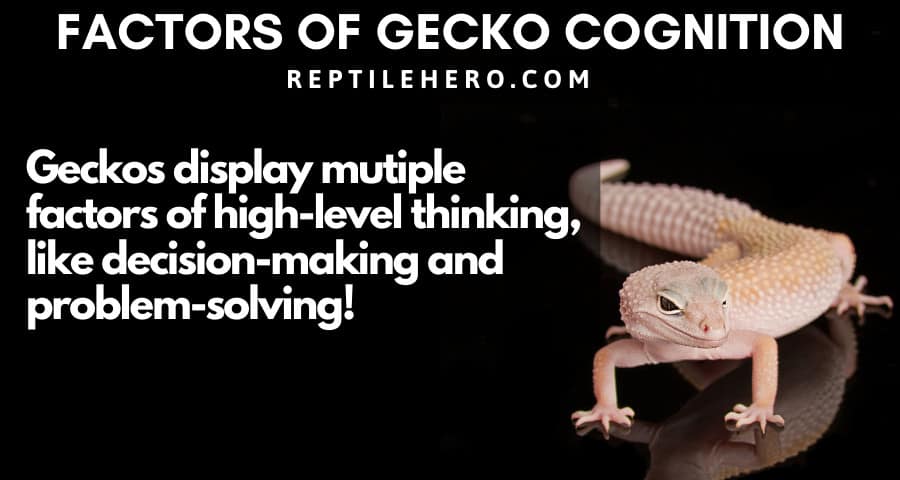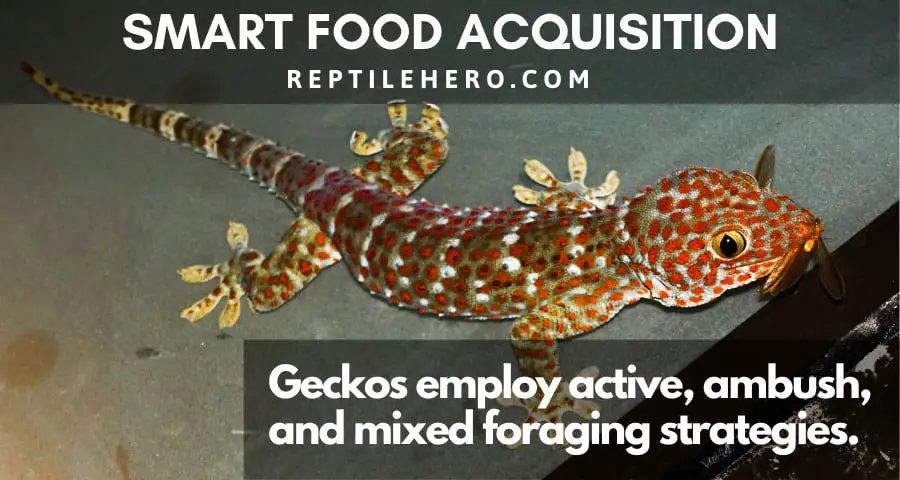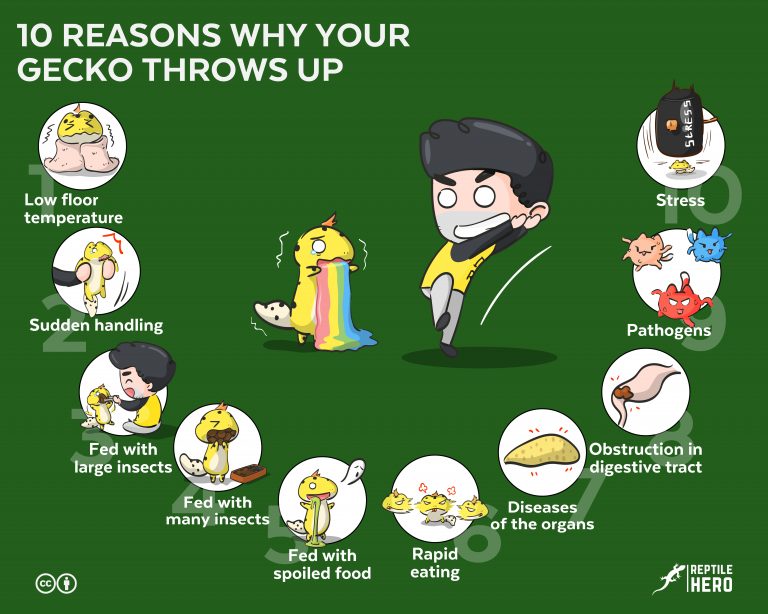Are Geckos Smart? (You Will Not Believe It!)
Many people find it inconceivable that geckos may be smart animals. Unfortunately, this is largely true even within the reptile community. However, science might give our leopard and crested geckos more credit than any of us would even expect!
Generally, geckos can be considered intelligent animals as they exhibit various higher-level cognitive abilities. Recent studies have disproved the widely held notion that geckos are incapable of displaying complex mental activities. Geckos display their intelligence from avoiding predators to complex learning.
Although there is currently very limited study done on reptile cognition, almost all evidence gathered seems to prove their mental prowess. Read on to find out how intelligent your gecko might be!
Exploring The Science of Gecko Intelligence
Currently, it is not possible to quantify a gecko’s degree of intelligence. However, these lizards have shown multiple behaviors which reveal that they are highly cognizant animals. Furthermore, geckos continuously learn from their experiences and adapt to various circumstances to survive.
To be quite frank with you, it’s difficult to definitively determine how smart geckos actually are. Like many other animals, geckos can neither write nor read so we can’t really design a test of intelligence for them to answer.
However, human brains and abilities shouldn’t be regarded as the gold standard when it comes to determining the intelligence of all living beings on earth. More importantly, intelligence isn’t a one-dimensional concept either.
As you probably know, there is even one theory on human intelligence saying that there are 8 specific types of intelligence. This includes linguistic, naturalistic, and spatial intelligence. So gecko intelligence is most probably multi-faceted too!
Additionally, scientists prefer to use the terms cognition or cognitive abilities to refer to a gecko’s overall mental capabilities and capacities. In fact, researchers have a special name for studies on this matter—cold-blooded cognition.
Note: For this article though, I will be using cognition and intelligence interchangeably to avoid being too pedantic. Below you can find some details on it.
13 Factors of Cognition in Geckos and Other Animals
Cognition for animals (e.g., geckos, snakes, turtles) is comprised of [1, 2]:
- Attention
- Communication
- Consciousness
- Decision-making
- Inquisitiveness
- Learning
- Memory
- Novel behaviors
- Play behaviors
- Problem-solving
- Sensory discrimination
- Social cognition
- Spatial cognition
- Time recognition
- Visual cognition
No single factor is sufficient to determine a gecko’s actual level of intelligence. At least, not yet. However, we can’t deny that they are incredibly clever creatures.
Sure, some people will try to argue that geckos do everything based on instincts alone. But even that statement proves that they carefully think and consider things through to ensure their survival!

Geckos—or any other reptile, for that matter—don’t live their lives on autopilot. Let us consider wild geckos, to prove my point. Wild geckos will inevitably come across situations where they would need to think and choose their course of action.
From the list above, you can probably recall moments when your gecko was able to prove just how smart it actually is.
Struggling to remember any clever moments with your gecko? Then continue to the next section. My examples might help jog your memory!
9 Signs Which Prove That Geckos are Smart
Geckos can demonstrate highly complex cognitive abilities through various skills and behaviors. Below are common signs which show that geckos are intelligent:
- Danger avoidance
- Self-preservation
- Reproductive behaviors
- Communication
- Social cognition
- Spatial awareness
- Object discrimination
- Flexibility in learning
- Hunting and foraging
Contrary to popular belief, geckos and reptiles, in general, are not thoughtless beings. They don’t just mindlessly wander around their tanks or the expansive world around us. We may not readily notice or acknowledge it, but these animals can display a myriad of smart behaviors in their daily lives.
1. Danger Avoidance
All geckos naturally and actively engage in relatively complex behavior like avoiding danger. Examples of danger avoidance in geckos are shed-eating and predator evasion.
Let’s first talk about shed-eating, which scientists formally refer to as keratophagy. This has been observed in both wild and captive geckos.
It may look and sound weird to us, but geckos intentionally ingest their slough for many reasons. One of those reasons is to make sure that potential predators in their habit cannot track them down easily!
Learn more about shedding and possible problems with it in our article on stuck shed.
Similarly, geckos generally don’t expose themselves out in the open unless they feel safe and secure.
In the unfortunate event that they do get cornered by a predator—let’s say, a cat—they move about their tail to distract it. While doing so, they also look into their surroundings to see if there’s an available escape route.
So yes, you could say that our precious geckos are pretty street-smart!
2. Self-Preservation
Geckos are intelligent in that they will always choose self-preservation when given over risking their lives for food, among many other things. They also consider possible losses when they are in dangerous situations (e.g., losing reserves due to tail dropping).
During times when food is scarce and going out of rock crevices and burrows to hunt for prey is especially dangerous, geckos will opt to stay hidden from predators.
More specifically, they will stay in areas with considerably low temperatures to also slow down their metabolism [3]. At the same time, they will also engage in fasting. This is pretty much what happens when they brumate in winter.
However, when the temperature starts rising at noon a gecko will try to warm up its body as much as possible. In doing so, they will have higher chances of catching prey and escaping from predators.
Tail Dropping: A Smart Sacrifice for Survival
Now let’s continue from where we left off in the previous section. If a gecko runs out of time before being able to successfully and quickly flee for its life, the cat could grab onto the gecko’s tail.
When it does happen, a gecko is faced with only two options. It could stay still and face its inevitable death at the clawed paws of a cat. Or the gecko could drop its tail and make a run for it. That right there is decision-making in action.
A smart gecko won’t just accept its doom calmly. Instead, it will think of a way to get out of and avoid dangerous situations, even if that means sacrificing its tail.
3. Reproductive Behaviors
Female geckos, in particular, have demonstrated complicated social behavior during breeding and reproduction such as mate rejection, sperm retention, and cryptic female choice.
Surprisingly, geckos, despite being considered primitive and hormonal animals, are actually very selective and smart animals—especially female geckos.
1. Mate Rejection
In fact, these ladies don’t just give in to the whims of male geckos during the breeding season. When they do not like being courted and pursued, they will make it clear.
Personally, I have heard dozens of stories of male geckos getting injured by females after getting rejected from professional breeders. It can get pretty bloody.
2. Sperm Retention
Plus, there are gecko species capable of retaining sperm that they view as valuable or of good quality for several years.
Having enough stored sperm, they can continue laying eggs when they think it’s a safe and favorable time to do so without having to mate again.
3. Cryptic Female Choice
Even more amazing, when they think that the sperm they received is not good enough, they can choose to not fertilize the egg that they are making. This phenomenon is called the cryptic female choice.
This saves them the trouble of placing too much effort and energy into giving life to a weak and/or malformed baby. At the very least, a female gecko can still eat an infertile egg to reabsorb the nutrients that she initially lost.
4. Communication
Geckos can convey and comprehend messages through various means, proving that they are smart animals. They can communicate with each other vocally, physically, and through chemical cues such as pheromones.
The thing is, geckos cannot talk like we do. Unlike humans, they can’t communicate verbally with each other. Because of this, many underestimate their abilities. However, just because we don’t understand how geckos communicate with each other does not mean that they are incapable of doing so.
1. Vocal Communication
But geckos are not only able to produce vocalization, they are also smart enough to understand it!
Learn more about vocalization in our article on geckos and clicking sounds.
Although the way geckos communicate with each other is not considered sophisticated by most people, these clever animals are still able to converse with each other.
2. Body Language
In reality, geckos are highly expressive animals despite having relatively stiff facial muscles. Though they cannot smile, they make full use of their whole body whenever they want to get their point across.
How would you know that your geckos are not happy? Unhappy geckos are likely to display aggressive and stressed behaviors, this includes the infamous tail waving which is commonly a warning sign.
3. Chemical Communication
Geckos can also communicate with each other using their pheromones [4]. To help you understand what I mean by this, let’s talk about territories.
It would be taxing for geckos to have to always vocalize and explore every inch of their own territory just to make sure that others know that they have staked their claim on that area.
Though this can help them stop others from invading their space, it can also catch the attention of predators in the area. As such, geckos have to think of another solution—marking their territory with their pheromones to deter other geckos.
5. Social Cognition
Even though most geckos prefer solitude, they are still able to process, remember, interpret, and use information about themselves and others. This is referred to as social cognition and is one of the many facets of animal intelligence.
Some people believe that reptiles are incapable of socializing because they are primarily solitary animals by nature.
Additionally, geckos do not possess a hippocampus, the part of our brain that is in charge of our overall sociability. However, geckos actually have a brain structure that functions similarly, the medial cortex [5].
Now, stay with me on this! I know this all sounds pretty technical but I won’t bore you with scientific values or complicated jargon. Geckos manifest social intelligence in several ways including, but not limited to social cues, gaze following, and nest guarding.
1. Social Cues
This is closely related to communication among geckos. Geckos observe each other for social cues. Then, from that information, they will decide how to respond and react.
2. Gaze Following
Geckos normally keep their eyes peeled for objects moving in their surroundings to be able to determine if they are threats or not.
This is why they sometimes look like they are staring at you, following your every move—because they are!
3. Nest Guarding
Although rarely observed in geckos, Tokay geckos (Gekko gecko) have been documented guarding their eggs and hatchlings in captivity.
6. Spatial Awareness
A gecko is capable of navigating around its surroundings because it possesses spatial awareness. Reptiles, like mammals, can use visual cues to determine their location in relation to everything else in the environment.
This is probably how they are able to return to their chosen shelters after hunting for prey in the wild. Like us, they probably have landmarks in their minds that they use to find out where they should go.
For such activities, we can also infer that geckos possess a relatively good working memory. Otherwise, they would always be lost in their native habitats, unable to find permanent shelter.
But what about pet geckos? I think this is evident in them knowing which of the multiple hides they have in their enclosure is the moist hide. If you’ve trained your gecko to only do its business in a certain part of its tank, you’ve got another proof that your gecko has spatial intelligence!
Spatial Intelligence and Mazes for Geckos
Want to test your pet gecko’s navigation skills? Let it try solving a maze, preferably a radial arm maze.
A smart gecko will solve the regular maze faster each time it goes through it. Some crafty geckos may also try to escape by going over the walls.
With a radial arm maze, a clever gecko should be able to obtain the food at the end of each arm without going back to previous paths they have already taken.
7. Object Discrimination
In general, geckos can distinguish themselves, other geckos, prey, and other materials in their environment which is another sign of high-level intelligence. The ability to discriminate between living and non-living objects is indicative of visual cognition.
Even though geckos are unable to see the different shades of red in the same way we can, they actually have pretty efficient vision.
Learn more about reptile vision in our article on red lights.
In reality, they are highly capable in terms of processing a variety of sensory information other than vision. The same can be said for humans who are color blind too—we don’t rely on our sense of sight alone.
To be more specific, geckos can differentiate between objects by using sensory information such as:
- Brightness
- Color
- Chemical cues
- Line
- Location
- Orientation
- Shape
- Size
- Smell
- Sound
- Taste
- Texture
Fun Fact: Aside from this, geckos are also able to recognize their owners from other people.
Geckos are able to discriminate objects in pictures and videos as well. Considering how some sensory information is no longer available in these, you can see how amazing geckos can be!
However, geckos are not perfect. So you’ll probably hear stories about them trying to chomp on objects that resemble the live insects they are used to hunting.
8. Flexibility in Learning
Geckos are highly capable of learning by themselves and by watching others. This is sufficient proof that geckos are smart animals. Learning allows them to adapt to changes in their environments and resolve the problems they face.
All animals, like us humans, learn as we grow, experience new things, and explore new places. So we can’t expect geckos to know how to do every single thing from the moment they hatch—or are given birth to.
If you have ever been able to keep a gecko from hatching to adulthood, you know what I mean by this. When it comes to feeding, for instance, baby geckos usually struggle at the start. But as they age and gain more experience, they can become quite excellent hunters
Their incredible capacity to learn is also quite evident in the fact that geckos can be trained to do different tricks and activities. Haven’t tried doing that yet? Then go ahead and give it your best shot!
Find out simple tricks you can teach your gecko in our article on training.
But keep in mind that geckos require a pretty specific range of body temperature for them to do complex activities such as learning. So be sure to give them a space that is conducive to learning when attempting to train them.
9. Hunting and Foraging
One of the most fundamental ways geckos display their intelligence is when they are hunting or foraging for food. In these tasks, many other cognitive skills and processes are involved, like attention, decision-making, and sensory discrimination.
Acquiring food is not an automatic task for either wild or captive geckos. Geckos don’t just magically catch insects and find edible fruits out of thin air. Unlike us, geckos can’t just readily stroll into the market to buy their groceries either.

Scavenging for live insects and searching for safe plants to eat are both very involved activities for geckos, especially since they are ectothermic animals who cannot produce sufficient body heat on their own.
Geckos need a lot of time, effort, and practice to get food—regardless if they are kept in captivity or living in their native habitats. If there are obstacles in the way, they need to figure out how to overcome them in order to feed.
They can even employ different strategies to ensure a successful hunt. A gecko could silently but actively stalk its prey, sit and wait before ambushing it, or do a mix of both.
Fun Fact: Some reptiles—crocodiles and alligators, specifically—even place sticks on their heads to attract birds!
Are Geckos Smarter Than Other Animals?
It is still unclear how geckos compare to other animals in terms of intelligence. Experts say that there is still a massive lack of research on the cognitive abilities of geckos, specifically, to ascertain whether or not they are smarter than other animals.
I know this answer is a bit of a letdown for many of you, considering all the praises I’ve been singing for geckos in the past sections. However, we really need more extensive studies to know for certain just how intelligent geckos are compared to other animals.
But even though many believe that larger animals, both reptile and non-reptile, are smarter, this is not necessarily true.
The truth of the matter is there are just more studies done to test and measure how smart mammals are—like cats, dogs, and even dolphins. (And yes, you read that right, dolphins are marine animals!)
Many scientists think that the cognitive abilities of all animals are highly comparable to one another. This is mostly because our brain structures are actually more similar than they are different [6].
Further Questions
Does brain size determine animal intelligence?
Intelligence cannot be determined solely by the size of an animal’s brain. The whole-brain must be taken into consideration, such as its specific parts’ complexity, how they function individually and all together, as well as the processes they affect and manage.
Why do people think that reptiles are not smart animals?
Many people have the belief that geckos, and reptiles in general, are dumb because they fail to match our standards for human intelligence. Fortunately, more and more scientists are recognizing this flaw in the scientific approach to examining reptile intelligence.
Which lizard is the smartest?
There are claims that large-bodied lizards—like monitors and tegus—are the smartest, but researchers are still largely uncertain of this. Because research on “cold-blooded cognition” is considered to still be in its infancy, it is difficult to draw detailed comparisons and conclude cognitive ranking among lizards, and reptiles in general.
Are geckos sentient beings?
Yes, geckos are sentient because they have the ability to: 1) feel emotions, 2) have awareness, 3) appraise risks versus benefits, 4) remember objects and events, and also 5) evaluate themselves against everything else around them.
Do geckos have feelings?
According to several recent studies, geckos and most other reptiles are indeed capable of feeling a variety of negative and positive emotions. However, since they do not readily move their facial muscles to express their affective states many keepers and breeders mistakenly assume that they are emotionless creatures.
How long do geckos live?
Most geckos species can live for 20-30 years in captivity. However, there are a few geckos that have been known to have lifespans of over 40 years old. More specifically, different forest gecko species closely related to Cupola geckos have lived for several decades in New Zealand.
Summary of Are Geckos Smart?
Geckos are smart animals because they exhibit behaviors that require multiple factors of high-level cognitive functioning. These factors include but are not limited to decision-making, memory, problem-solving, sensory discrimination, and social cognition.
Furthermore, geckos engage in activities that prove their cognitive abilities. This includes seemingly simple tasks, from danger avoidance to food acquisition.
Unfortunately, researchers are still unable to determine the gecko’s intelligence as a whole. As such, they cannot definitively determine if specific animals are smarter than geckos or not. However, many of them do believe that their cognitive abilities are on par with one another based on data currently available on the topic.
Sources
[1] https://www.karger.com/Article/Abstract/351996
[2] https://www.vin.com/apputil/content/defaultadv1.aspx?pId=25844&catId=150704&id=9768903
[3] https://www.ncbi.nlm.nih.gov/pmc/articles/PMC7769583/
[4] https://www.researchgate.net/publication/275639411_Pheromones_and_Chemical_Communication_in_Lizards

![Choose the Right Thermostat for Your Gecko Tank [7 Factors]](https://www.reptilehero.com/wp-content/uploads/2021/09/choose-gecko-tank-thermostat-small-cover-infographic.jpg)
![Leopard Gecko Morphs 101 [Rarity, Price, and Color]](https://www.reptilehero.com/wp-content/uploads/2021/03/word-image-34-768x576.png)
![How to Travel In a Car With Your Gecko? [6 Dos and 2 Don’ts]](https://www.reptilehero.com/wp-content/uploads/2021/12/car-ride-gecko-cc-768x614.jpg)


